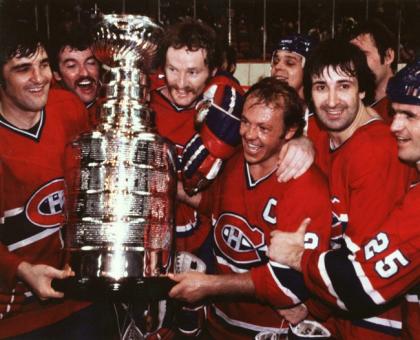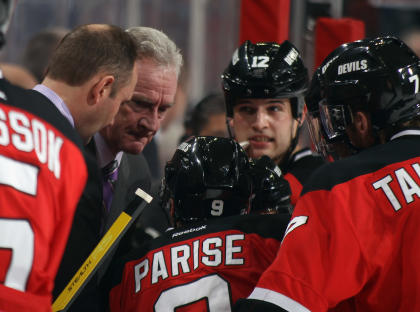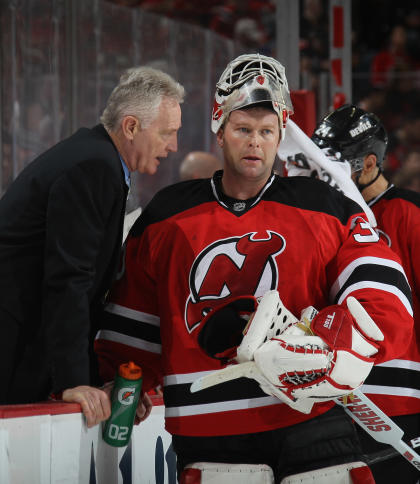Q & A: Competitive fire still burns within Hockey Hall of Fame defenceman Larry Robinson

Larry Robinson is a fierce competitor. Always has been. That burning desire to win fuelled him as a player and drives him as a coach.
One of the most talented players in NHL history, Robinson won the Stanley Cup six times as a player, once as a head coach and was also a key member for Team Canada in championship runs at both the 1976 and 1984 Canada Cup tournaments.
Recently, Eh Game had a chance to talk with the Hall of Fame defenceman about his new autobiography The Great Defender which was released last month.
Robinson, 63, makes it crystal clear that a win or loss means as much to him today as a coach as it did when he burst onto the scene with the Montreal Canadiens over 40 years ago during the 1972-73 season.
After spending his first 17 seasons with the Montreal Canadiens, he played another three seasons with the Los Angeles Kings before retiring in 1992.
His No. 19 was retired by the Canadiens on Nov. 19, 2007.
In his post-playing days, he has been the head coach of the Kings (1995-1999) as well as the New Jersey Devils (2000-2002) where he won the Stanley Cup in 2000. He also served as an assistant coach on their 1995 and 2003 championship teams.
He is currently an associate coach with the San Jose Sharks.
This will be his last year behind the bench for an NHL team. Robinson says he will spend the final two seasons of his contract with the Sharks in an off-ice role which makes it an opportune time to talk about both the past and present.
=====================================================================
Eh Game: Why did you want to publish a book at this time and what was the writing process like?
Larry Robinson: I did another autobiography before called Robinson for the Defence about 15 years ago, maybe less. My kids were after me to get it republished and sold in the U.S. because it was only sold in Canada. When we started to look into the rights, we couldn’t do it.
My son-in-law got approached by a couple of publishing companies to do it and it came to fruition. Kevin Shea did all the research and looked through the original book. I sat down and did a bunch of interviews. He took some stuff from the old book and then added the newer stuff.
EG: The book starts off with your account of the infamous body check on Philadelphia Flyers forward Gary Dornhoefer during Game 2 of the 1976 Stanley Cup Final. Why? When you think of all that you have accomplished in the game, what is it about this play that makes it stand out?
LR: I think when you are dealing with the people that are going to read the book, there will be some that will remember that hit and others that are too young to remember it.
When they are talking about some of the best hits of all-time that hit still gets played.
You look at all the different Stanley Cup finals and you can always look at something that defines that particular series – you can always say “what if that hadn’t happened?”
A lot of people remember that hit because of the circumstances that surrounded it.
If that hit happened and they weren’t known as The Broad Street Bullies – it may not have always been significant They scared the crap out of the league because of the type of team they were.
As the Montreal Canadiens we could feel it as a group playing in that series – the whole league was looking at us to change the way the game was played, to show you could win without having to (violently) intimidate, that was the true meaning of what was really going on.
(That hit) showed that you can be physical and intimidating without having to drop your gloves.

EG: At the beginning of Chapter 7 you refer to Montreal as a city where the pressure can either make or break a player and that in your case, it made you. Can you expand on this notion and do you think it is even harder these days in the age of social media for players - especially young stars such like Carey Price and P.K. Subban?
LR: It’s a different kind of pressure and no doubt harder on the athletes now because of Facebook and Twitter. Back then you could live in anonymity a little bit, now your face is all over the place and if you screw up somewhere – the whole world is going to know about it.
There is a lot of pressure in Montreal where you can be scrutinized as much in a game as you can for a bad practice. There was a certain pressure on people to preform and that type of pressure drove me. I did not need people to be hard on me. I was hard on myself, I drove myself so playing in that atmosphere was beneficial to me. Our practices were as good as a lot of the games.
I challenged myself through anytime that I played even when I was (playing) peewee. If they were talking about someone else and how great he was, I took it upon myself to play better than the guy they were talking about.
If you can’t handle pressure and you let bad games or a bad goal bother you - it’s a tough place because people know there hockey. Hockey is king in Montreal, it’s the sport – it’s like a religion.
EG: Did becoming a parent when you were just 19 help ground you in any way?
LR: Being a parent at such a young age, my last year of junior, it was tough - extremely tough, now all of a sudden you are not thinking about yourself, you are thinking about your family. In retrospect that helped me out.
If you are a young guy playing the sport and you don’t have any responsibilities, you don’t have to worry about a two-year-old child and wife then it’s a little different. When you are finished a game or practice you don’t have someone to go back to – it’s just you.
EG: Speaking of family, your brother Moe played for the Canadiens during briefly in the late 70s. Playing in your shadow must have been tough, how do you look back at that scenario in hindsight?
LR: I didn’t look at is as him being in my shadow, I felt sorry for him because he didn’t have his own identity, It was always Larry’s brother this and Larry’s brother that – he never really got a chance to show the kind of player that he was.
There was one year that I went with him to GM Irving Grundman to request a trade to the Minnesota North Stars. He had a chance to play with their farm team in Oklahoma City the year before and loved it. The North Stars agreed to the trade but it never happened (Montreal turned it down). That left a sour taste in his mouth and he decided to get out of hockey. If he had been given the chance, he might have played in the NHL – he was a pretty smart player.
EG: You won five cups in your first seven seasons from 1973-79. Scotty Bowman left the organization in 1979 after butting heads with Irving Grundman who was named GM prior to the 1978-79 season. Was that a turning point? How much more do you think you could have won if Bowman stayed on?
LR: When you have dynasties like that such as the Oilers, Islanders and ourselves – you have a nucleus of maybe eight players – take those players and add another four years on, some retire like in our case with Pete Mahovlich, Jimmy Roberts, Serge Savard and so on. When we had those four years in a row of winning the Stanley Cup – maybe you had one or two new players that came in for most part.
That’s what happened, I think Scotty could see the writing on the wall and decided to move on – we weren’t going to be as good as we once were.

EG: Your best and worst moments in the game are listed as winning the Stanley Cup with the Devils in 2000 and losing in the 2001 final to the Avalanche. It’s surprising that these ultimate highs and lows have come as a coach as opposed to a player?
LR: It’s so different.
I was a member of the national team that won the Canada Cup in 1976 and in 1984 I was a captain and it is great playing for your county.
When you are playing for the Stanley Cup – it’s a whole different thing. It entails a whole year of being together, playing a lot of games and blood, sweat and tears. It’s about the team but the only guy that you have to worry about is yourself – that’s all you gotta’ worry about.
In the end, when you do win, you go home with all these bumps and bruises and 10 or 12 pounds under weight, it’s all worth it. That’s what you paid the price for.
When you are a coach it’s not about you. It entails the players, the assistant coaches, the GMs. Now you are making decisions that affect every body.
You get maybe four and a half hours of sleep a night. If you are lucky and when you wake up, you go at it again. You are constantly thinking “Who am I going to rest? How am I going to play those lines?”
When it’s all over – to have that feeling of accomplishing that, it’s truly special. That’s why for me that 2000 Cup was so special. The other fact that I came in near the end was even more special. I wasn’t winning it for myself, I was thinking of how many hours Robbie (Ftorek) put in and what he meant to my career, then to go through the whole thing again only to have it taken away from me at the end. . . .
There were some decisions that if we had to do over we could have changed the outcome and that kind of eats away at you.
You look back at Game 6 and we outshot them (Dallas) like 12-5 in the first period and they had the lead. Looking back I would have changed the lineup. (Sergei) Nemchinov was recovering from a concussion and was not 100 percent. I still think I could have left him out another game.
Once you had it, you want it again – that’s why we do what we do.
EG: Would you like to coach in Montreal?
LR: I’m at the end of my career, I’ve done everything I wanted to do. I think now and even more so after this past week and half where we have lost so many great people in the sport, it’s time I start thinking more about my family than winning a 10th cup. Hopefully I can fulfil that dream this year but there are 29 other teams thinking the same thing.
This will be the last year that I spend behind the bench coaching, I have two more years with the Sharks in a player development/consultant role and I will work out of my house in Florida.
EG: In the book, you delve into why you left your position as head coach with the Devils. Did knowing that Pat Burns was sick at the time affect your decision to leave during the 2005-06 season.
LR: No not really, I’m the type of person - I’m hard on myself, it’s hard for me when I’m in a position of coach or as an assistant, it’s hard for me not to take it home.
Over the years – the constant stress of trying to win and doing the things you have to do as a coach – it came to a head. I put so much pressure on myself that I started to make myself sick- it was time to get away.
I would have been sick if I stayed on, the funny thing about it is the first call I got was from Joel Quenneville and I think the call was the greatest thing that ever happened to me.
He told me the same thing happened to him in St. Louis, you don’t think straight, the least little thing bothers you, you can’t sleep – everything bothers you, the stress of the game and the stress of position you are in. Anyone that tells you that being a head coach is easy hasn’t done it.
There are lot of constraints on time and family. Every day you have to answer to players, the press, the GM – everybody, and you gotta’ plan for another day. It’s a very stressful l life, but enjoyable at the same time. If you didn’t enjoy it, you wouldn't be able to do it and if it doesn’t affect you - you don’t care and if you don’t care you shouldn’t be doing it.

EG: Staying current, with Martin Brodeur coming back, you call him the best goalie you ever saw. That’s pretty high praise considering you played with Ken Dryden and Patrick Roy.
LR: If I was starting a team and you were going to offer any of those three –you couldn’t go wrong with any one one of them. I can’t say anything bad about any of them.
One thing Marty did that both the others couldn’t was handle the puck. He basically changed the game. They put in the trap (trapezoid behind the goal line where goalies aren’t allowed to handle the puck) because of how he handled the puck, that made him special. He could probably pass the puck better than 50 percent of our defencemen.
EG: You have won at every level. San Jose is a team that has been tagged with the inability to win the big one. What do you see in this team?
LR: The only thing we haven’t had in all the years I have been here especially in the playoffs is a bounce that goes our way. When we look back at the series against the Kings (the Sharks were up 3-0 in the first round of the 2014 playoffs and lost), we counted seven or eight open nets that we missed.
The difference between winning and losing has been a bad goal or a no-goal call.
We’ve been close, really close. Last year I thought we had the team that could maybe go all the way but we lost an important piece of our team in Raffi Torres to suspension and Danny Boyle just wasn’t (feeling) right. He had a concussion and was shy about getting hit.
This team reminds me a lot of the 2000 Stanley Cup team in New Jersey. There is a mixture of veterans and some youngsters. If I was to compare that would be the closest. The only difference is we don’t have Marty (Brodeur).
Follow Neil Acharya on Twitter @Neil_Acharya

 Yahoo Sports
Yahoo Sports 

